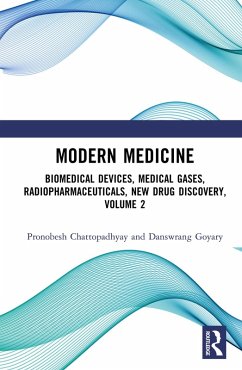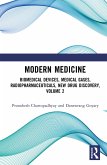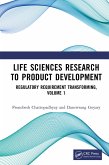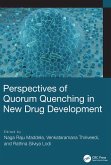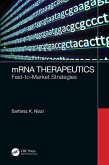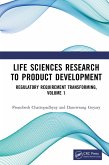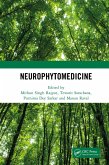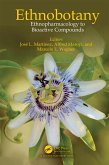Pronobesh Chattopadhyay, Danswrang Goyary
Modern Medicine (eBook, PDF)
Biomedical Devices, Medical Gases, Radiopharmaceuticals, New Drug Discovery, Volume 2
52,95 €
52,95 €
inkl. MwSt.
Sofort per Download lieferbar

26 °P sammeln
52,95 €
Als Download kaufen

52,95 €
inkl. MwSt.
Sofort per Download lieferbar

26 °P sammeln
Jetzt verschenken
Alle Infos zum eBook verschenken
52,95 €
inkl. MwSt.
Sofort per Download lieferbar
Alle Infos zum eBook verschenken

26 °P sammeln
Pronobesh Chattopadhyay, Danswrang Goyary
Modern Medicine (eBook, PDF)
Biomedical Devices, Medical Gases, Radiopharmaceuticals, New Drug Discovery, Volume 2
- Format: PDF
- Merkliste
- Auf die Merkliste
- Bewerten Bewerten
- Teilen
- Produkt teilen
- Produkterinnerung
- Produkterinnerung

Bitte loggen Sie sich zunächst in Ihr Kundenkonto ein oder registrieren Sie sich bei
bücher.de, um das eBook-Abo tolino select nutzen zu können.
Hier können Sie sich einloggen
Hier können Sie sich einloggen
Sie sind bereits eingeloggt. Klicken Sie auf 2. tolino select Abo, um fortzufahren.

Bitte loggen Sie sich zunächst in Ihr Kundenkonto ein oder registrieren Sie sich bei bücher.de, um das eBook-Abo tolino select nutzen zu können.
The present volume-2 of book Title " Book Title: Modern Medicine: Biomedical Device, Medical Gas, Radiopharmaceuticals, New Drug Discovery (Volume 2) " discusses the procedures of drug approval and regulatory requirements that must be met according to the United States Food and Drug Administration (FDA), EMA, and the CDSCO.
- Geräte: PC
- mit Kopierschutz
- eBook Hilfe
Andere Kunden interessierten sich auch für
![Modern Medicine (eBook, ePUB) Modern Medicine (eBook, ePUB)]() Pronobesh ChattopadhyayModern Medicine (eBook, ePUB)52,95 €
Pronobesh ChattopadhyayModern Medicine (eBook, ePUB)52,95 €![Life Sciences Research to Product Development (eBook, PDF) Life Sciences Research to Product Development (eBook, PDF)]() Pronobesh ChattopadhyayLife Sciences Research to Product Development (eBook, PDF)52,95 €
Pronobesh ChattopadhyayLife Sciences Research to Product Development (eBook, PDF)52,95 €![Perspectives of Quorum Quenching in New Drug Development (eBook, PDF) Perspectives of Quorum Quenching in New Drug Development (eBook, PDF)]() Perspectives of Quorum Quenching in New Drug Development (eBook, PDF)137,95 €
Perspectives of Quorum Quenching in New Drug Development (eBook, PDF)137,95 €![mRNA Therapeutics (eBook, PDF) mRNA Therapeutics (eBook, PDF)]() Sarfaraz K. NiazimRNA Therapeutics (eBook, PDF)49,95 €
Sarfaraz K. NiazimRNA Therapeutics (eBook, PDF)49,95 €![Life Sciences Research to Product Development (eBook, ePUB) Life Sciences Research to Product Development (eBook, ePUB)]() Pronobesh ChattopadhyayLife Sciences Research to Product Development (eBook, ePUB)52,95 €
Pronobesh ChattopadhyayLife Sciences Research to Product Development (eBook, ePUB)52,95 €![NeuroPhytomedicine (eBook, PDF) NeuroPhytomedicine (eBook, PDF)]() NeuroPhytomedicine (eBook, PDF)52,95 €
NeuroPhytomedicine (eBook, PDF)52,95 €![Ethnobotany (eBook, PDF) Ethnobotany (eBook, PDF)]() Ethnobotany (eBook, PDF)55,95 €
Ethnobotany (eBook, PDF)55,95 €-
-
-
The present volume-2 of book Title "Book Title: Modern Medicine: Biomedical Device, Medical Gas, Radiopharmaceuticals, New Drug Discovery (Volume 2)" discusses the procedures of drug approval and regulatory requirements that must be met according to the United States Food and Drug Administration (FDA), EMA, and the CDSCO.
Dieser Download kann aus rechtlichen Gründen nur mit Rechnungsadresse in A, B, BG, CY, CZ, D, DK, EW, E, FIN, F, GR, HR, H, IRL, I, LT, L, LR, M, NL, PL, P, R, S, SLO, SK ausgeliefert werden.
Produktdetails
- Produktdetails
- Verlag: Taylor & Francis eBooks
- Seitenzahl: 380
- Erscheinungstermin: 2. Mai 2024
- Englisch
- ISBN-13: 9781040018316
- Artikelnr.: 70185111
- Verlag: Taylor & Francis eBooks
- Seitenzahl: 380
- Erscheinungstermin: 2. Mai 2024
- Englisch
- ISBN-13: 9781040018316
- Artikelnr.: 70185111
- Herstellerkennzeichnung Die Herstellerinformationen sind derzeit nicht verfügbar.
Dr. Pronobesh Chattopadhyay, Ph.D., FNASc., FICS, is a pharmaceutical scientist in the Defence Research Laboratory (DRDO), Tezpur. His working areas are chemical pharmacology, toxicological interaction on expression, chemical target to TRPV, AdipoR1, AdipoR2, c-Jun kinase pathway in lungs and eyes, and these resulted in exploration to development of many defense products. He was instrumental in developing many defense products which are successfully used by India's armed forces. A notable technology like the "chili grenade" developed from Bhot Jolakia (one of the hottest chilies in the world) has been transferred (transfer of technology) to three industries and is presently used successfully by many law enforcing agencies in India. He also developed protective gear for ultra-violet protection which is stable at -50 C for armed forces deployed in Siachen Glacier; and he has contributed to the development of many products for protecting the armed forces deployed in jungle warfare. He is a Fellow of the National Academy of Sciences India (NASI) and Fellow of Indian Chemical Society (FICS). He has published more than 170 research papers and five book chapters, and filed 15 patents, three of which have been granted. He has received many awards, including the Gandhi Young Technology Innovation Awards under Biotechnology Industry Research Assistance Council (BIRAC), Laboratory Scientist Awards, Technology Awards from DRDO etc. He is a regular reviewer of ethnopharmacology, toxicology, and biochemical pharmacology, and Elsevier publishing house recognized him as a potential reviewer. Twelve Ph.D. degrees and three postdoctoral degrees have been awarded under his supervision, and 25 postgraduate students completed their dissertations.
Dr. Danswrang Goyary, Ph.D., graduated in Biotechnology and completed his M.Sc. and Ph.D. in Biochemistry from North Eastern Hill University (NEHU), Shillong, India. He qualified NET-JRF (UG-CSIR) in 2002 and received a fellowship for his doctoral degree. He started his professional career at Defence Institute of Bio-Energy Research (then Defence Agricultural Research Laboratory), Haldwani (Uttarakhand) as a scientist in the year 2005 and extensively contributed in the fields of life sciences and biopharmaceuticals of defence importance as a biochemist.
Dr. Goyary is presently working in Defence Research Laboratory (DRDO), Tezpur. He is actively involved in studying the mechanism of different kinds of wound healing, haemostasis, and he is associated with the development of defence products such as chili grenades, snake repellent, high SPF sunscreen, impregnated fabrics for disease vector and insect control etc. He has contributed more than 50 publications in peer-reviewed journals, secured two patents, supervised three Ph.D. students, and guided more than 15 postgraduate students. He has received laboratory awards such as Technology Group awards, Science Day oration award, Technology Day oration award etc. He is a member of many committees such as institutional animal ethical committees (IAEC) and institutional biosafety committees (IBSC).
Dr. Danswrang Goyary, Ph.D., graduated in Biotechnology and completed his M.Sc. and Ph.D. in Biochemistry from North Eastern Hill University (NEHU), Shillong, India. He qualified NET-JRF (UG-CSIR) in 2002 and received a fellowship for his doctoral degree. He started his professional career at Defence Institute of Bio-Energy Research (then Defence Agricultural Research Laboratory), Haldwani (Uttarakhand) as a scientist in the year 2005 and extensively contributed in the fields of life sciences and biopharmaceuticals of defence importance as a biochemist.
Dr. Goyary is presently working in Defence Research Laboratory (DRDO), Tezpur. He is actively involved in studying the mechanism of different kinds of wound healing, haemostasis, and he is associated with the development of defence products such as chili grenades, snake repellent, high SPF sunscreen, impregnated fabrics for disease vector and insect control etc. He has contributed more than 50 publications in peer-reviewed journals, secured two patents, supervised three Ph.D. students, and guided more than 15 postgraduate students. He has received laboratory awards such as Technology Group awards, Science Day oration award, Technology Day oration award etc. He is a member of many committees such as institutional animal ethical committees (IAEC) and institutional biosafety committees (IBSC).
1. New Drug or Investigational New Drug Applications (INDA) Approval
Process with the Drugs and Cosmetics Act
2. Biomedical Device Rules and Enforcement
3. Schedule of Medical Device and Minimum Requirement of Approval
4. Approval and Registration Process of a Biomedical Device
5. Quality Assurance of Biomedical Devices Central Drugs Standard
Control Organization (CDSCO), the United States Food and Drug
Administration (US FDA) and the European Union (EU) Regulations
6. Regulation in Practising Telemedicine at the Edge of Data
Confidentiality and Medical Ethics
7. Compressed Medical Gases: Regulations and Quality Control
8. Regulation of Radiopharmaceuticals in the Preview of the Drugs and
Cosmetics Act, 1940
9. Abbreviated New Drug Application (ANDA) or Generic Drug Approval
Process
10. Biological Licence Application (BLA) Procedures
11. Regulatory Approval of Biosimilars Including Nucleic Acid-based
Recombinant Products, Recombinant Therapeutic Enzymes, and Protein
12. Regulations of Biopharmaceuticals Using Living Microorganisms,
Genetically Modified Foods, and Vaccine Development
13. Role of Institutional Bio Safety Committee
14. Orphan Drugs and Regulatory Approval
15. Regulatory Approval Process of In Vitro Diagnostics
Process with the Drugs and Cosmetics Act
2. Biomedical Device Rules and Enforcement
3. Schedule of Medical Device and Minimum Requirement of Approval
4. Approval and Registration Process of a Biomedical Device
5. Quality Assurance of Biomedical Devices Central Drugs Standard
Control Organization (CDSCO), the United States Food and Drug
Administration (US FDA) and the European Union (EU) Regulations
6. Regulation in Practising Telemedicine at the Edge of Data
Confidentiality and Medical Ethics
7. Compressed Medical Gases: Regulations and Quality Control
8. Regulation of Radiopharmaceuticals in the Preview of the Drugs and
Cosmetics Act, 1940
9. Abbreviated New Drug Application (ANDA) or Generic Drug Approval
Process
10. Biological Licence Application (BLA) Procedures
11. Regulatory Approval of Biosimilars Including Nucleic Acid-based
Recombinant Products, Recombinant Therapeutic Enzymes, and Protein
12. Regulations of Biopharmaceuticals Using Living Microorganisms,
Genetically Modified Foods, and Vaccine Development
13. Role of Institutional Bio Safety Committee
14. Orphan Drugs and Regulatory Approval
15. Regulatory Approval Process of In Vitro Diagnostics
1. New Drug or Investigational New Drug Applications (INDA) Approval
Process with the Drugs and Cosmetics Act
2. Biomedical Device Rules and Enforcement
3. Schedule of Medical Device and Minimum Requirement of Approval
4. Approval and Registration Process of a Biomedical Device
5. Quality Assurance of Biomedical Devices Central Drugs Standard
Control Organization (CDSCO), the United States Food and Drug
Administration (US FDA) and the European Union (EU) Regulations
6. Regulation in Practising Telemedicine at the Edge of Data
Confidentiality and Medical Ethics
7. Compressed Medical Gases: Regulations and Quality Control
8. Regulation of Radiopharmaceuticals in the Preview of the Drugs and
Cosmetics Act, 1940
9. Abbreviated New Drug Application (ANDA) or Generic Drug Approval
Process
10. Biological Licence Application (BLA) Procedures
11. Regulatory Approval of Biosimilars Including Nucleic Acid-based
Recombinant Products, Recombinant Therapeutic Enzymes, and Protein
12. Regulations of Biopharmaceuticals Using Living Microorganisms,
Genetically Modified Foods, and Vaccine Development
13. Role of Institutional Bio Safety Committee
14. Orphan Drugs and Regulatory Approval
15. Regulatory Approval Process of In Vitro Diagnostics
Process with the Drugs and Cosmetics Act
2. Biomedical Device Rules and Enforcement
3. Schedule of Medical Device and Minimum Requirement of Approval
4. Approval and Registration Process of a Biomedical Device
5. Quality Assurance of Biomedical Devices Central Drugs Standard
Control Organization (CDSCO), the United States Food and Drug
Administration (US FDA) and the European Union (EU) Regulations
6. Regulation in Practising Telemedicine at the Edge of Data
Confidentiality and Medical Ethics
7. Compressed Medical Gases: Regulations and Quality Control
8. Regulation of Radiopharmaceuticals in the Preview of the Drugs and
Cosmetics Act, 1940
9. Abbreviated New Drug Application (ANDA) or Generic Drug Approval
Process
10. Biological Licence Application (BLA) Procedures
11. Regulatory Approval of Biosimilars Including Nucleic Acid-based
Recombinant Products, Recombinant Therapeutic Enzymes, and Protein
12. Regulations of Biopharmaceuticals Using Living Microorganisms,
Genetically Modified Foods, and Vaccine Development
13. Role of Institutional Bio Safety Committee
14. Orphan Drugs and Regulatory Approval
15. Regulatory Approval Process of In Vitro Diagnostics
